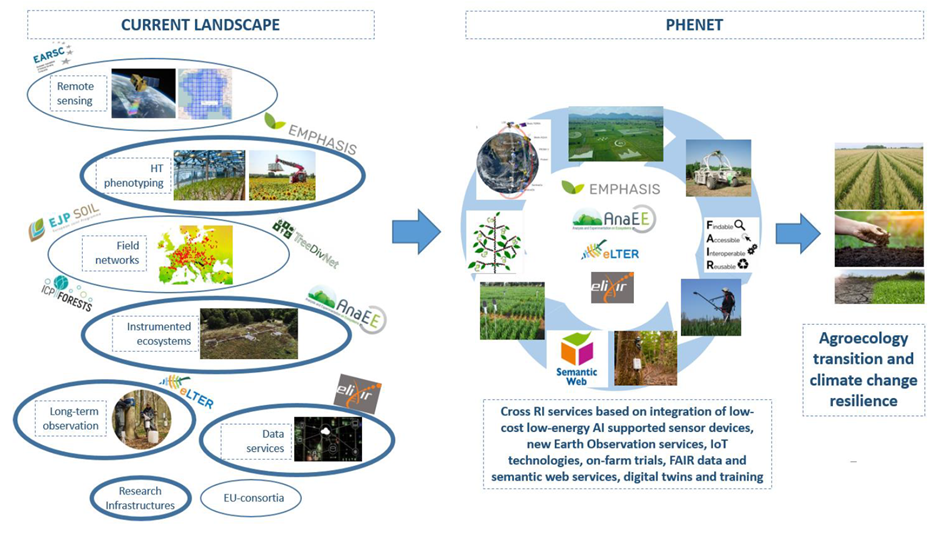- Index
- >Projects
- >Projects in progress
- >PHENET
PHENET Research Project
Tools and methods for extended plant PHENotyping and EnviroTyping services of European Research Infrastructures
Group : Information, Signal, Image and Life Sciences
Labelling: none
Duration: 60 months (from January 2023 to December 2027)
Funding: Horizon Europe - https://cordis.europa.eu/project/id/101094587
Staff involved from LARIS: David Rousseau
Project partners: Participants (26) Université catholique de Louvain – Belgium, Forschungszentrum Julich GMBH – Germany, Centre Wallon de recherches agronomiques – Belgium, Universitaet fuer bodenkultur Wien – Austria, Centro di sperimentazione Laimburg – Italy, INRAE transfert SAS – France, Wageningen University – Netherlands, Université d'Angers – France, Groupe d'étude et de contrôle des variétés et des semences – France, Rheinische Friedrich-Wilhelms-Universitat Bonn – Germany, Helmholtz-zentrum fur umweltforschung GMBH – UFZ – Germany, HIPHEN – France, Uppsala Universitet – Sweden, GEOSYS – France, Universidade nova de Lisboa – Portugal, Université d'Aix Marseille – France, Centre National de la Recherche Scientifique CNRS – France, Soil Capital Belgium – Belgium, Universiteit Hasselt – Belgium, Universidade do Porto – Portugal, Stichting EGI – Netherlands, Centre de Coopération Internationale en Recherche Agronomique pour le Développement - C.I.R.A.D. EPIC – France, Stichting Wageningen Research – Netherlands, Institut de recerca i tecnologia agroalimentaries – Spain, BETTER3FRUIT NV – Belgium, Analysis and experimentation on ecosystems ERIC - France Partners (3) Eidgenoessisches departement fuer wirtschaft, bildung und forschung – Switzerland, Eidgenoessische technische hochschule Zuerich – Switzerland, S4 Mobile Laboratories - United States
Link : https://www.phenet.eu/en
Aims and objectives
In PHENET, the European Research Infrastructures (RI) on plant phenotyping (EMPHASIS), ecosystems experimentation (AnaEE), long-term observation (eLTER) and data management and bioinformatics (ELIXIR) will join their forces to co-develop, with a diversity of innovative companies, new tools and methods - meant to contribute to new RI services - for the identification of future-proofed combinations of species, genotypes and management practices in front of the most likely climatic scenarios across Europe.
Ambitioning to go beyond current highly instrumented but often spatially and temporally limited RI installations, PHENET derived services will allow wide access to enlarged sources of in-situ phenotypic and environmental data thanks to (i) new AI-based multi (agroecology-related) traits multi-sensors devices (ii) to unleashed access to high resolution Earth Observation data connected to ground based data, (iii) FAIR data support for connection with (iv) new generation of predictive modeling solutions encompassing AI and digital twins. Developments will be challenged by and implemented in a series of eight Use Cases covering a large range of agroecosystems but also of ecosystems to demonstrate portability of solutions. Several of these Use Cases will mobilize on-farm data. A large effort will be devoted to training RI staff and beyond through a sustained collection of training material fed by experts. Outreaching activities will aim at enlarging the range of RI users. PHENET will not only strengthen RI but will also have major impact on the development of innovative companies on phenotyping, envirotyping and precision agriculture as well as on the emergence of climate smart crop varieties and innovative practices fitted to climate change and agroecological transition.

Figure 1: PHENET concept: Left panel: current landscape of research infrastructures and other EU consortia and networks. Right panel: PHENET ambition is to leverage on big data revolution (IoT, EO, FAIR data, models) to identify pathways towards agroecology transition and climate change resilience.


